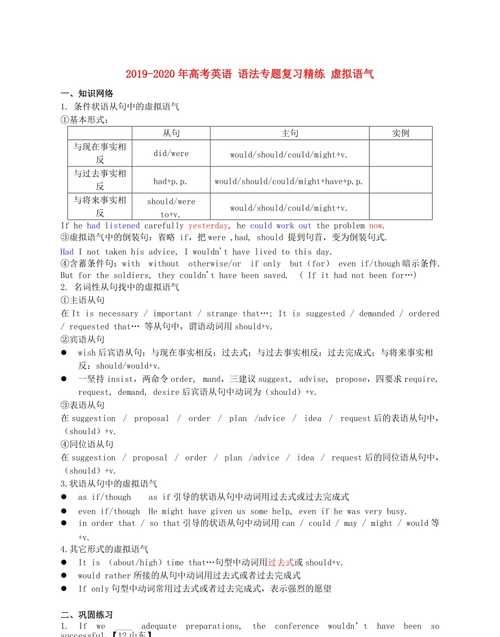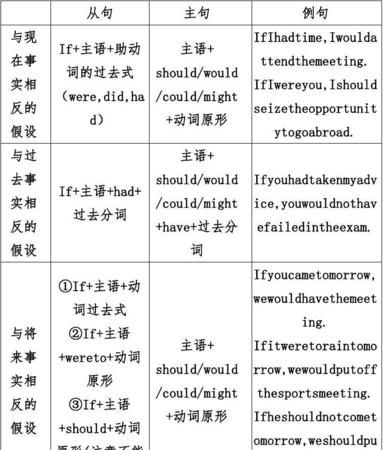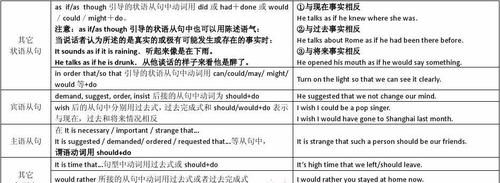本文目录
高中虚拟语气的用法归纳
一、 条件句中的虚拟语气
1. 条件句中虚拟语气的形式
从句中提出一种与客观现实不相符或根本不可能存在的条件,主句会产生的一种不可能获得的结果。条件句中的虚拟语气根据不同的时间有三种不同的形式。
时间
从句谓语形式
主句谓语形式
将来
动词过去式(be用were)
should + 动词原形
were to + 动词原形
would / should / might / could + 动词原形
现在
动词过去式(be 用 were)
would / should / might / could + 动词原形
过去
had +动词过去分词
would / should / might / could have + 动词过去分词
2. 条件句中的虚拟语气的举例
(1) 将来时的条件句中的虚拟语气。如:
If he should go to Qing Hua University, he would make full use of his time. 如果他要上清华大学的话,他就会充分利用他的时间了。
If he were to come here, he would tell us about it. 如果他要来的话,他会通知我们一声。
(2) 现在时的条件句中的虚拟语气。如:
If he were free, he would help us. 要是他有空的话,它会帮助我们的。
If he studied at this school, he would know you well. 如果他在这所学校学习的话,它会对你很熟悉。
(3) 过去时的条件句中的虚拟语气。如:
If I had seen the film, I would have told you about it. 我如果看过这场电影,我会把电影内容告诉你了。
If I had got there earlier, I would have met Mr. Li. 如果我早点到那儿,我就会会到了李先生。
3. 运用条件句中的虚拟语气时,须注意的几个问题
(1) 当从句的主语为第三人称单数时,谓语动词若是系动词be时,可用 was 代替 were。但在倒装虚拟结构及 if I were you, as it were 中,只能用 were。如:
Were I ten years younger, I would study abroad. 要是我还年轻十岁的话,我会去国外学习。
If I were you, I would try my best to grasp the chance. 要是我是你的话,我要尽力抓住这次机会。
(2) 有时,虚拟条件句中,主、从句的动作若不是同时发生时,须区别对待。
①从句的动作与过去事实相反,而主句的动作与现在或现在正在发生的事实不符。如:
If I had worked hard at school, I would be an engineer, too. 如果我在学校学习刻苦的话,我现在也会使工程师了
If they had informed us, we would not come here now. 如果他们通知过我们的话,我们现在就不会来这里了。
②从句的动作与现在事实相反,而主句的动作与过去事实不符。如:
If he were free today, we would have sent him to Beijing. 如果他今天有空的话,我们会已经派他去北京了。
If he knew her, he would have greeted her. 要是他认识她的话,他肯定会去问候她了。
③从句的动作与过去发生的情况相反,而主句的动作与现在正在发生的情况相反。如:
If it had not been raining too much, the crops would be growing much better. 如果天不下太多的雨的话,庄家会长得更好。
If he had been working hard, he would be working in the office now. 要是他工作一直努力的话,他现在已进了办公室了。
(3) 当虚拟条件句的谓语动词含有 were, should, had 时,if 可省略,而将 were, should, had等词置于句首。如:
Should he agree to go there, we would send him there. 要是他答应去的话,我们就派他去。
Were she here, she would agree with us. 如果她在这儿的话,她会同意我们的。
Had he learnt about computers, we would have hired him to work here. 如果她懂一些电脑知识的话,我们会已经聘用他来这里工作了(from ***)。
(4) 有时,句子没有直接给出假设情况的条件,而须通过上下文或其他方式来判断。如:
I would have come to see you, but I was too busy. 我本该来看你了,然而我太忙了。
But for his help, we would be working now. 要不是他的帮助,我们还会在工作呢。
Without your instruction, I would not have made such great progress. 要是没有你的指导,我不会取得如此大的进步。
(5) 有时,虚拟条件句中,主、从句可以省略其中的一个,来表示说话人的一种强烈的感情。
①省略从句
He would have finished it. 他本该完成了。
You could have passed this exam. 你应该会通过这次考试了。
②省略主句
If I were at home now. 要是我现在在家里该多好啊。
If only I had got it. 要是我得到它了该多好啊。
二、其他状语从句的虚拟语气
1. 目的状语从句中的虚拟语气
(1) 在 for fear that, in case, lest 引导的目的状语从句中,若用虚拟语气时,从句谓语为: should + 动词原形。并且 should 不能省略
She examined the door again for fear that a thief should come in. 她又把门检查了一遍,以防盗贼的进入。
He started out earlier lest he should be late. 他很早就出发了以防迟到。
(2) 在 so that, in order that 所引导的目的状语从句中,从句中的谓语为:can / may / could / might / will / would / should + 动词原形。如(from ***):
He goes closer to the speaker so that he can hear him clearer. 他走近说话的人以便能挺得更清楚。
He read the letter carefully in order that he should not miss a word. 他把信读得很仔细以便不漏掉一个单词。
2. 让步状语从句中的虚拟语气
(1) 在 even if, even though 所引导的让步状语从句中,可用虚拟语气,主句、从句的结构与 if 所引导的条件从句结构相同。如:
Even if he were here himself, he should not know what to do. 即使他亲自来也不知该怎么办。
Nobody could save him even though Hua Tuo should come here. 即使华佗在世也救不了他。
(2) 在whatever, whichever, whenever, whoever, wherever, however, no matter wh-word 等引导的让步状语从句中,从句虚拟语气结构为:
① may +动词原形(指现在或将来)。如:
We will finish it on time no matter what / whatever may happen. 不管发生什么事,我们都要按时完成。
We will find him wherever / no matter where he may be. 无论他在哪里,我们都要找到他。
I will wait for him no matter how late he may come. 不管他来的多么晚,我都会等他。
② may +完成式(指过去) ,主句结构不限。如:
You mustn’t be proud whatever / no matter what great progress you may have made. 不管你取得了多么大的进步,你也不能骄傲(from ***)。
We must respect him no matter what / whatever mistakes he may have made. 不管他翻过什么错误,我们必须尊敬他。
(3) 在though, although等引导的让步状语从句中,从句虚拟语气结构为 should +动词原形,主句结构不限。如:
Although / Though he should often be late, he is a good student. 尽管他经常迟到,他还是个好学生。
Although / Though he should be secretary, he must obey the rules. 尽管他是书记,他也必须遵守规定。
3. 方式状语从句中的虚拟语气
as if, as though 引导的方式状语从句常用虚拟语气。虚拟语气的结构为:
表示所发生的时间
虚拟语气结构
发生在主句动作之前
had + 过去分词
与主句动作同时发生
过去时(be 用were )
发生在主句动作之后
would / could / might / should+原形动词
例如:
They began to talk warmly as if they had known each other for long. 他们开始热烈的谈论起来就好像他们已相互认识很久了。
He coughed twice as if someone should come. 他咳嗽两声就好像有人要来了。
4. 原因状语从句中的虚拟语气
amazed, angry, annoyed, astonished, disappointed, frightened, happy, pleased, proud, sorry, surprised, upset 等后面的状语从句中常用虚拟语气。其虚拟语气的结构为:
① should + 原形动词(指现在或将来)。如:
He was angry that you should call him by name. 他很生气,你竟然对他直呼其名。
I was astonished that he should not answer such an easy question. 我很惊讶他竟答不出如此简单的问题。
② should + 完成式, 指过去。如:
I’m very sorry that you should have failed the exam. 我很遗憾,你这次考试竟然失败了。
I was very surprised that Father should have known what I did yesterday. 我很吃惊,父亲竟指导我昨天所作的事情(from ***)。
三、宾语从句中的虚拟语气
1.英语中,如:advise, ask, demand, desire, decide, insist(坚决要求) , order, propose, request, suggest(建议) 表示请求、要求、命令或建议等意义的动词所接的宾语从句一般用虚拟语气,其虚拟语气的结构为:(should) + 原形动词。如:
The teacher advised that we should make good use of every minute here. 老师劝我们要好好地利用在这儿的每一分钟。
The Party asked that we should serve the people with our heart and soul. 党要求我们要全心全意地为人民服务。
但是,当insist的意思为:坚决认为,坚持说;suggest的意思为:表明,暗含,暗示等时,宾语从句一般不用虚拟语气。如:
Tom insisted that he hadn’t stolen the watch. 汤姆坚持说他没有偷那块手表。
His smile suggested that he had succeeded in this exam. 他的微笑表明他在考试中成功了。
2. believe, expect, suspect, think, imagine 等动词的否定句或疑问句中的宾语从句常用虚拟语气。其虚拟语气的结构为:should + 原形动词。如:
Can you believe that he should kill a tiger? 你能相信他竟杀死了一只老虎?
Can you imagine that he should take the first place in the long jump contest? 你能想象得到他在跳远比赛中竟获得了第一名?
3. 英语中,wish 之后的宾语从句,表示一种没有实现或根本不可能实现的愿望,常用虚拟语气。其虚拟语气的结构为(from ***):
表示所发生的时间
虚拟语气结构
发生在主句动作之前
(1)had + 过去分词;
(2)would / could / might / should + have + 过去分词
与主句动作同时发生
过去时(be 用were )
发生在主句动作之后
would / could / might / should + 原形动词
例如:
I wish I learnt English well. 我希望我已学好了英语。
I wish I had been there with them last week. 我希望上周跟他们一起在那儿。
He wishes we could go and play games with him. 他希望我们能去跟他做游戏。
4. 英语中,would rather, had rather, would sooner等之后的宾语从句常表示与客观事实不相符的一种愿望,故使用虚拟语气。其虚拟语气的结构为:
表示所发生的时间
虚拟语气结构
过去
had + 过去分词;
现在
过去时(be 用were )
将来
过去时(be 用were )
例如:
I’d rather you had seen the film yesterday. 我倒想你昨天看过了这场电影。
I’d rather you were here now. 我倒想你现在在这儿。
We’d rather you went here tomorrow. 我么倒想你明天去那儿。
四、主语从句中的虚拟语气
在表达惊异、惋惜、遗憾、理应如此等意义的主语从句中常使用虚拟语气,其虚拟语其的结构为: should + 动词原形,主句中的谓语动词形式不限。
句型:
(1) It is admirable / dreadful / extraordinary / odd / remarkable / sad / advisable / annoying / disappointing / surprising / upsetting / frightening / better / best / curious / desirable / important / strange / peculiar / proper / necessary / natural …that…
(2) It is a pity / a shame / no wonder…. that…
(3) It is suggested / requested / desired / proposed /…. that …
(4) It worries me that…
如:
It is important that we should do well in our lessons first. 我们先把功课学好很重要。
It is strange that he should not come. 很奇怪,他竟没有来。
It is a pity that we should not meet last night. 真遗憾我们昨天晚上没有见过面。
It worries me that we should be blamed for that. 我们竟要受责备真让人烦恼。
五、表语从句及同位语从句中虚拟语气
英语中,表示请求、要求、命令、建议等名词advice, desire, decision, idea, instruction, order, plan, proposal, recommendation, request, requirement, suggestion, wish充当句子的主语而后面接表语从句或它们后面接同位语时,表语从表面上看几屗及同位语从句都须用虚拟语气。其虚拟语气的结构为:(should) + 动词原形。如:
We followed his advice that we should ask our teacher for help. 我们接受了他的建议:我们应该请求老师的帮助(from ***)。
He told us his idea that he should go to university. 他告诉了我们他的想法:他想上大学。
His suggestion is that we should do our work more carefully. 他的建议就是我们的工作要更细心些。
Their plan is that they should build a new factory in their hometown. 他们的计划就是在家乡建一座新工厂。
六、定语从句中的虚拟语气
英语中,表示:“早该做某事了”时,定语从句中的谓语动词须用虚拟语气,其虚拟语气的结构为:It is (high / about) time that + 主语+ 动词的过去式/ should + 动词原形。如:
It is time that I went to pick up my daughter at school. 我该去学校接我的女儿了。
It is high time you should go to work. 你早该上班了。
七、简单句中的虚拟语气
1. 说话时,为了表示客气、谦虚、委婉而有礼貌,言语常使用虚拟语气。其虚拟语气的结构形式常为:would / could / might / should + 原形动词。如:
Would you mind my shutting the door? 我把门关起来你介意吗?
You should always learn this lesson by heart. 你要把这个教训牢记于心。
I should agree with you. 我应该同意你的观点。
2. 表示“祝愿”时,常用“may + 主语 + 动词原形 + 其他”。如:
May you have a good journey! 祝你一路顺风。
May your youth last for ever! 祝你青春永驻。
3. 表示强烈的“愿望”、“祝愿”时,常用动词原形。如:
Long live the Communist Party of China. 中|国|共|产|党|万|岁。
God bless us. 上帝保佑。
4. 习惯表达中常用的虚拟语气。
(1) 提出请求或邀请。如:
Would you like to have a talk with us this evening? 今天晚上来跟我们聊天好吗?
Could I use your bike now? 我可以用一下你的单车吗?
(2) 陈述自己的观点或看法。如:
I should glad to meet you. 见到你我会很高兴。
I would try my best to help you. 我会尽力帮助你。
(3) 提出劝告或建议。如:
You’d better ask your father first. 你最好先问一问你的父亲。
You should make a full investigation of it first. 你应该先全面调查一番。
(4) 提出问题。如:
Do you think he could get here on time? 你认为他能按时来吗?
Do you expect he would tell us the truth? 你期望他会告诉我们真相吗?
(5) 表示对过去情况的责备时,常用虚拟语气。其虚拟语气的结构为:“情态动词 + have + 过去分词”。如:
You should have got here earlier. 你应该早就到这里了。
You should have returned it to him. 你应该把他还给他了。

高一英语虚拟语气语法总结
虚拟语气是以动词的特殊形式来说明句中所叙述的内容不是事实,或是不可能发生的事情,而是一种愿望、建议或是与事实相反的一种假设。虚拟语气通常出现在各种主从复合句中。
一、在宾语从句中
1.当主句的谓语动词为“suggest,propose,advise,insist,order,demand,require,request, desire’’等表示“建议”、“命令”、“请求”和“要求”的动词时,其后的宾语从句中要用虚拟语气“should+动词原形”(在美国英语中 should省略)。例如:
I suggest that we(should)hold a meeting tonight.我建议我们今晚开个会。
We advise that steps(should)be taken at once.我们建议要立刻采取措施。
They insisted that he(should)begin the work at once.他们坚持让他立刻开始工作。
He ordered that aU(should)take part in the work.他下令所有的人都要参加这项工作。
另外,当主句动词为“ask,move,urse”等意为 “要求”、 “提议”和“极力主张”时,其宾语从句也常用虚拟语气。例如:
He asked that he be given an opportunity to try.他要求给他一个尝试的机会。
I move that the money be used for books. 我提议把这笔钱用于买书。
They urged that we take action on this matter immediately.他们极力主张我们对这件事立即采取行动。
2.当主句动词为wish,表示“但愿……”,“要是……该多好叼”之意时,其后的宾语从句有以下三种虚拟语气形式。
①动词用过去式来说明与现在的事实相反(BE动词常用were,但有时也可用was)。例如:
I wish 1 were/Was as strong as you.我要是像你一样强壮就好了。
I wish l remembered his address.我要是记住他的地址就好了。
有时;为了强调现在状态下能发生某种情况或进行某项动作,从句中的动词也可用过去进行式。例如:
I wish it wasn’t raining.要是天不下雨就好
了。
②动词用过去完成式说明与过去的事实相反。例如:
We wish we had paid more attention to our pronunciation.我们以前要是能更注意我们的发音就好了。
He wished he had stayed at home。他但愿他呆在了家里。
③情态动词“would,could,might”等后接动词原形,表示对将来的希望(通常不用should)。例如:
I wish he would try again.我希望他再试一下。
We wish he could come.我们希望他能来。
3.在prefer之后的宾语从句中用“should+动词原形”(should可省略)。例如:
We prefer that the plan(should)be fully discussed before being put into execution.我们希望在计划实施之前进行认真的讨论。
4.在would rather之后的宾语从句中,其动词用虚拟语气,表示句子的主语(某人)宁愿让另一人做某事。
①用动词过去式表示现在或将来要做的事。例如:
I’d rather you went home now.我宁愿让你现在就回家。
Don’t come tomorrow.I’d rather you came nextweekend.明天别来,我宁愿你下个周末来。
一Shall l open a window?我开窗行吗? 一I’d rather you didn’t.你最好别开。
②用动词的过去完成式表示过去的动作。
例如:
I’d rather you hadn’t done that.我真希望(宁愿)你没做过那件事。
二、在主语从句中
1.在句型“h is/was+过去分词+that从句”中,当过去分词为“suggested,ordered,desired,insisted, required,demanded,requested,decided,proposed,urged’’等时,从句中要用“should+动词原形”(should可省略)。例如:
h is desired that everyone(should)get erything ready bY toniShL要求每一个人在今晚之前要将一切准备好。
It is requested that Miss Zhang(should) give a performance at the party.请求张小姐在晚会上表演一个节目。
2.在句型“h is/Was+形容词+that从句”中,当形容词为“important,necessary,strange,natural’’等时,从句中要用“should+动词原形”(should可省略)。例如:
It is important and necessary that we should master a foreign language.掌握一门外语对我们来说是重要的和必要的。
It is strange that he (should) refuse your help.他竟然拒绝你们的帮助,真奇怪。
3.在句型“h is/was+名词+that从句” 中,当名词为“a pity,a shame,no wonder’等时,从句中要用“should+动词原形”(should可省略)。例如:
It is a great pity that he should be so selfish。真遗憾,他竟然那么自私。
三、在同位语从句或表语从句中
在名词“suggestion,proposal,idea,plan,order,advice’’等后面的同位语从句或表语从句中,用“should+动词原形”(should可省略)。例如:
I made a proposal that we(should)hold a meeting next week.我提出了我们下个星期开会的建议。(同位语从句)
His suggestion that the meeting(shoald)be held in this room has been accepted.他的关于在这个房间召开会议的建议被采纳了。(同位语从句)
My idea is that we(should)get more people to attend the conference.我的想法是我们多找些人来参加会议。(表语从句)
四、在定语从句中
在句型“h is(high)time+(that)从句”中,谓语须用虚拟语气。用过去式表示现在或将来的意念,意为“现在是该做某事的时候了”。
例如:
It iS(high)time(that)we went home.我们该回家了。
五、在状语从句中
1.在假设条件句的if条件从句中
假设条件句一般是由“if引导的条件从句+主句”构成。if从句中的谓语动词要用虚拟语气的形式。if从句的假设可以是与现在事实相反的条件、与过去事实相反的条件或者与将来不太可能成为事实的条件。下面分述表示这三种条件的if从句的结构:
①与现在的事实相反,其句子结构为“If+主语+were/谓语动词的过去式”。例如:
If I were you,I shouldn’t do that.如果我是你,就不会做那件事了。
We would go with you if we had time.如果我们有时间的话,就和你一道去了。
We could ask him if he were here.如果他在这儿,我们就可以问他了。
②与过去的事实相反,其句子结构为“If十主语+谓语动词的过去完成式”。例如:
If he had seen you yesterday,he would have asked you about it如果昨天他见到你,他就会问你那件事了。
If you had come earlier,you would have met him.如果你早点儿来,就会遇到他了。
1 would have called you if I had known your telephone number.如果我知道你的电话号码,就打电话给你了。
③表示将来不太可能实现的条件,其句子结构为“If+主语+动词过去式/were to+动词原形/should+动词原形”。例如:
If he came tomorrow,he would find me in the schoo1.如果他明天来的话,会在学校找到我。
If it should rain,the crops would be saved.如果下雨,庄稼就有救了。
If it were to snow tomorrow,they would not go out.如果明天下雪,他们就不出去了。
注:在if从句中,如果含有“were,should,had’’时,可省去if而将“were,should,had’’置于句首,构成倒装句。例如:
Were l in your position,1 would go.如果我处在你的位子上,我就走了。
Had you arrived five minutes earlier,you could have seen them off.如果你早到五分钟,
你就可以给他们送行了。
Should he come,tell him to ring me up.如果他来的话,叫他打电话给我。
2.在目的状语从句中
①在由lest
和in case等引导的目的状语从句中,用“should+动词原形” (should可省略)。例如:
He ran away lest he(should)be seen.他跑走了,以免被人看到。
She explained again and again in case he (should)misunderstand her.她解释了一遍又一遍,以免他误解她。
in case等引导的目的状语从句中的谓语有时也可用陈述语气。此时,从句表示的就是真实情况,而不是虚拟情况。例如:
Take warm clothes in case the weather is cold.带上厚衣服,以防天气变冷。
②在由“so that…”和“in order that…”
引导的目的从句中,要用“can/could/may/might/would+动词原形”,以表示目的并非事实。例如:
She stayed at home for a few days so that
she might/could take care of her sick mother. 她在家呆了几天,以便照顾她生病的母亲。
③在由“for fear that…”引导的从句中,用“should+动词原形”(有时也可用may/might/would)。例如:
He worked hard for fear that he should fail.他努力学习,害怕考试不及格。
3.在方式状语从句中
由as if和as though等引导的方式状语从句中,如果从句所表达的情况是虚拟的,则①常用动词的过去式来表示与现在或当时的情况相
反;如果是BE动词,则用were;②常用过去完成式来表示与过去的情况相反。例如:
She loves the child as if he were her own.她爱这孩子就好像是她亲生的。
(实际上不是她亲生的孩子)
Holding his head high,he walked past the pole and the soldiers as if they didn’t exist.他昂着头从旗杆和卫兵身旁走过,就像他们不存在似的。(实际上他们是存在的)
He speaks English as well as ifhe hadstudied in England.他英语说得这么好,好像他去英国学过英语似的。(实际上他没有在英国学过英语)
4.在原因状语从句中
在“I’m sorry that.—/We were surprised that一./They were disappointed that...”等引导的表示原因的状语从句中,用“should十动词原形”。例如:
I’m sorry that he should be in such poor health.他的身体这么差让我很难过。
We were surprised that she should be so stubbom.她这么固执让我们感到奇怪。
上述句子有时也可以用陈述语气,但这仅表示所叙述的是事实,而不表示讲话人的情绪。

高中英语虚拟语气思维导图
一、在非正式条件句中的运用
1. 构成
if 从句
主句
与现在事实相反
动词过去式或were
would / should / could / might + 动词原形
与过去事实相反
had+过去分词
would/should /could/might+ have
+过去分词
未来实现的可能性较小
should/were to+原形
动词过去式或were
would / should / could / might + 动词原形
If the Watergate Incident had not occurred, Nixon would not have resigned.
If the cover should have a crack in it, the harmful gas would come out and cause pollution.
If there were no gravity, we should not be able to walk.
If man were to solve this complicated problem, it would take him more than a month to get the result.
2. 连词if的省略。在正式文体中,引导非真实条件句的连词if可省略,were, had, should等助动词提到从句句首,形成倒装结构。
My cat wouldn’t have bitten the toy fish had she known it was made of rubber.
Were it to rain tomorrow, I would have to stay at home.
Should he come here tomorrow, John would bring you what you have been expecting.
Were I in your place, I wouldn’t do that.
3.含蓄条件。有些句子的假设不用if引导,而是隐含在诸如without, but for, but that, or, otherwise等介词、副词引起的短语或从句中。如:
Without electricity human life would be different today.
But for your help, we couldn’t have finished it so quickly.
I was ill that day, otherwise I would have taken part in the party.
I ought to have remembered to tell them the decision this morning, but I was so busy that I forgot to do so.
4. 错综时间。在非真实条件句中,主句和从句的动作不是发生在同一时间,须根据意思采用表示不同时间的动词形式。如:
If you had taken your medicine yesterday, you would be well now.
Today the Tennessee Valley is one of the richest areas in the world. But if things had been left as they were, it would now be a desert.
二、虚拟语气在其他情况下的运用
在wish所带的宾语从句中的运用。表示实现可能性极小或与事实相反的情况。有三种情况,列表如下
宾语从句
同时的情况
wish
wished
过去式
were
先于的情况
wish
wished
had + 过去分词
将来的愿望
wish
wished
would / could + 动词原形
I wished he had taken my advice.
I wish I could have time to go to London with you next month.
I wish I knew as much as you do.
2. If only 感叹句型及as if/as though引导的从句中的动词形式与wish所带的宾语从句中的形式相同。
If only I had taken his advice.
He felt as if he alone were responsible for what had happened.
3. 在表示建议、要求、命令等的从句中的运用。其形式常为should +动词原形或省略should的动词原形。
(1)用在宾语从句中。在suggest, propose, demand, command, order, insist, urge, require, request, advise, desire, recommend等动词后的宾语从句中。
I would like to propose that for sixty minutes each evening, all television broadcasting be prohibited by law.
The general commanded that we retreat at once.
(2)用在主语从句中。该结构通常为It is +形容词或过去分词+主语从句。此类形容词或过去分词有:essential, vital, necessary, urgent, desirable, advisable, demanded, suggested, ordered等。
It’s necessary that you be present at the meeting.
[注意]在It is a shame /shameful /a pity /pitiful+主语从句的结构中,主语从句中的助动词should不能省略,在该情况下,should表示“居然”、“竟然”。
It is pitiful that he should not be elected chairman.
(3)用在表语从句或同位语从句中。常用的这类名词有:advice, proposal, motion, suggestion, demand, preference等。
My proposal is that the dispute be settled by peaceful means.
4.在in case, for fear that, lest从句中的运用。表示“以防”、“以免”,动词用should+动词原形,或直接加动词原形。
She put a blank over the baby for fear that she should catch cold.
Take an umbrellas with you lest it rain.
5.在would rather, would as soon, would sooner 和would prefer 后的宾语从句中的运用,表示“宁愿”,从句动词用过去式表示当时或将来的情况,用过去完成式表示过去的情况。如:
I’d rather he painted the door blue.
6. It is (about/high) time +从句中的运用。表示该做而未做的事,并含有建议之意。从句中动词一般用过去式。如:
It’s high time that he studied hard.

苏教版高一英语必修一课本答案
一. 直接引语和间接引语 (一)直接引述别人的原话,叫做直接引语;用自己话转述别人的话,叫做间接引语。间接引语一般构成宾语从句。直接引语必须放在引号内,间接引语则不用引号。直接引语改为间接引语时,除将引语部分变成宾语从句外,还必须对直接引语中的人称、时态、指示代词、时间状语、地点状语等进行改变。 1. 时态的变化:直接引语变为间接引语时,通常受转述动词said, asked等的影响而使用过去化的时态,即把原来的时态向过去推,也就是一般现在时变为一般过去时,现在进行时变为过去进行时,等等。例如: Tom said to me,“My brother is doing his homework.” →Tom said to me that his brother was doing his homework. 2. 人称代词、指示代词、时间状语、地点状语等等的变化: 根据意义进行相应的变化,例如: She asked Jack,“Where have you been?” →She asked Jack where he had been. He said,“These books are mine.” →He said that those books were his. (二)直接引语改为间接引语时,都使用陈述语序,但是因为原句的句式不同,所以变成间接引语时所用的连词会有所不同。直接引语如果是一般疑问句,用连接词whether或if;如果是特殊疑问句,则用疑问词引导间接引语。转述的动词一般用asked,可以在其后加上一个间接宾语me, him, her, us等。如: She said,“Is your father at home?” →She asked me if/whether my father was at home. “What do you do every Sunday?”My friend asked me. →My friend asked me what I did every Sunday. 直接引语如果是祈使句,改为间接引语时,要将祈使句的动词原形变为带to的不定式,并在不定式的前面根据原句的语气(即请求或命令)加上ask, tell, order等动词,如果祈使句为否定式,则在不定式前加not。其句型为:ask / tell / order someone (not) to do something. 例如: She said to us,“Please sit down.” →She asked us to sit down. He said to him,“Go away!” →He ordered him to go away. He said, “Don’t make so much noise, boys.” →He told the boys not to make so much noise. 二. 各种时态的被动语态 被动语态概述 被动语态的概念:它是动词的一种形式,表示主语与谓语之间的执行或被执行关系。主动语态表示主语是谓语动作的执行者,例如:They saw the little boy crying by the river. 被动语态表示主语是谓语动作的承受者,例如:The little boy was seen crying by the river. 被动语态的构成 被动语态的形式是由“助动词be+动词的过去分词”构成。助动词be随着主语的人称、数、时态等的不同而变化。几种常见时态的被动语态形式如下: 1. 一般现在时 am/is/are + 过去分词 例如:Rice is planted in the south of China. 2. 一般过去时 was/were + 过去分词 例如:These trees were planted the year before last. 3. 一般将来时 will/shall + be + 过去分词 例如:A sports meeting will be held next week in our school. 4. 现在进行时 am/is/are + being + 过去分词 例如:Your radio is being repaired now. 5. 过去进行时 was/were + being + 过去分词 When he got there, the problem was being discussed. 6. 现在完成时 have/has + been + 过去分词 His work has been finished. Has his work been finished? Yes, it has. / No, it hasn’t. 7. 过去完成时 had + been + 过去分词 注意: 1.除了be之外的其它系动词如get, stay等也可以和过去分词构成被动语态。例如:Their questions haven’t got answered. 2. 含有情态动词的谓语变成被动语态使用“情态动词+ be + 过去分词”结构。例如: More attention should be paid to the old in this country. This work can’t be done until Mr. Black comes. 3. 含有“be going to”, “be to”等结构的谓语,其被动语态分别用“be going to + be + 过去分词”和“be to + be + 过去分词”。例如: The problem is going to be discussed at the next meeting. All these books are to be taken to the library. 4. 被动语态与系表结构的区别:“连系动词+用作表语的过去分词”构成的系表结构,与被动语态的形式完全一样,所以应注意它们的区别。被动语态中的过去分词是动词,多强调动作;系表结构中的过去分词相当于形容词,多强调状态。前者通常可用by 引出动作的执行者,而后者则不可以。例如: The map was changed by someone.(被动结构) That custom remained unchanged for many centuries.(系表结构) 系表结构中的过去分词通常可被very修饰,被动语态中的过去分词往往要用much修饰。 例如: He was very excited.(系表结构) He was much excited by her words.(被动结构) 5. 主动形式表被动意义。有些动词的主动形式有被动意味,如 open, read, sell, shut, wash, wear, write等。此时句子的主语一般是物。例如: These books sell well. 这些书很畅销。 The door won’t shut. 这门关不上。 The clothes wash well. 这些衣服很好洗。
Unit 11. 词组: add up add up to add… to… add to calm… down have got to be concerned about / with walk the dog cheat … of go through go ahead go by set down set up set off set out a series of on purpose by accident/ chance in order to so as to in order that so as that at dusk at dawn at midnight at noon face to face no longer not … any longer settle down suffer from recover from get/ be tired of make a list of list pack… up get along/ on with fall in love be grateful to sb. for sth. join in take part in join attend make sb/ sth + 宾语补足语 have something/ anything/ everything /nothing to do with it’s because….. +原因 it’s why…. + 结果 dare + (to) do (实义动词) do (情态动词) a year and a half it’s no pleasure+ doing sth happen to do sth have trouble with sb (in) doing sth exactly find it + adj. + to do sth make friends with s***e up come up with come in come on come out actually in fact as a matter of fact in reality be based on at present make use of make full/ good use of such as play a part/ role in recognize … as more than one + 谓语用单数 at the end of in the end at an end voyage tour travel journey than ever before even if / though communicate with those + 定语从句 用who 1600’s 1980s in + 物主代词 + 数字的复数 in his forties the former the latter a number of the number of make sense usage VS use believe it or not there is no such + 名词 (不加冠词) the way + in which / that /省略 especially specially straight adj/ advunit 3词组: prefer to do , rather than do would rather do , than do would do , rather than do fare VS fee ever since it’s is / has been + 时间段 + since 从句 graduate from/ in be fond of cut across cut up cut down care about care for determine to do sth = be determined to do sth change one’s mind make up one’s mind at an altitude of give in give up give off give out give away keep pace with as usual bend over take the advantage of persuade sb to do sth / into doing sth not to do sth/ out of doing sth advise sb to do sth try to persuade sb to do sth although though grow up insist on put up put down put off put on put away can hardly wait to do sth bend over take the advantage of persuade sb to do sth / into doing sth not to do sth/ out of doing sth advise sb to do sth try to persuade sb to do sth although though grow up insist on put up put down put off put on put away can hardly wait to do sth unit 4词组:right away at once immediately burst into laughter/ tears burst out doing sth as if / though in ruins injure wound hurt destroy damage be trapped in dig out bury oneself in doing sth rise raise arise too… to be away it seems as if + 陈述语气/ 虚拟语气 act out be pleased / willing/ glad to do sthhonor in honor of be proud of express my thanks to unit 5词组: of high/ good quality devote to + doing found VS set up in principle in peace out of work in work out of control in control vote for vote against be equal to in trouble turn to turn on / off turn up / down lose heart lose one’s heart escape from / + doing sth come to power / in power be sentenced to in one’s opinion fight for / against blow up dream of/ about imagine doing sth the first time for the first time 语法点1. whether VS if 的用法2. tell sb to do sth ask sb not to do sth 3. be + doing 表将来4. 定语从句: 只用that 的情况 只用who 的情况 只用which的情况 as VS which the same … as / that… such… as as … as 介词+ which/ whom which 引导一个句子的用法 非限制性定语从句which 引导一个句子的用法 非限制性定语从句 插入语 I think I believe I guess I thought 间隔式定语从句 Is this car the one he bought last year? Is this the car he bought last year? What 的用法5. will be done be about to be done be to be done be going to be done 6. has/ have been done 7. be being done 加always 表示一种厌烦等语气8. 强调句 it is + 被强调部分 + that 从句 It is not until + 时间 + that 从句 特殊疑问词 + is it that 从句 9. 倒装句 部分否定,含有否定词的 hardly never little only seldom 等, 把情态动词,be 动词, 助动词提到主语 的前面10. as if , insist suggest request command ,从句用虚拟语气, 用(should) do 。

以上就是关于高一英语虚拟语气语法总结,高中虚拟语气的用法归纳的全部内容,以及高一英语虚拟语气语法总结 的相关内容,希望能够帮到您。
